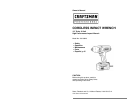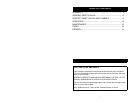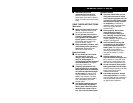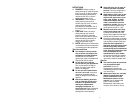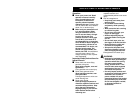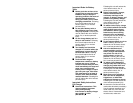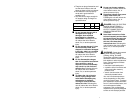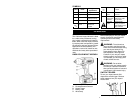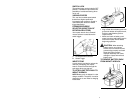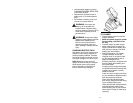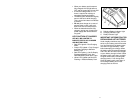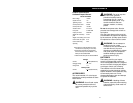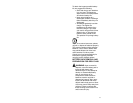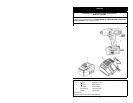
7
a.That pins on plug of extension cord
are the same number, size and
shape as those of plug on charger.
b.That extension cord is properly
wired and in good electrical
condition; and
c.That wire size is large enough for
AC ampere rating of charger as
specified below:
■ Do not operate charger with a
damaged cord or plug. If
damaged, have replaced
immediately by a qualified
serviceman. Following this rule
will reduce the risk of electric
shock, fire, or serious personal
injury.
■ Do not operate charger if it has
received a sharp blow, been
dropped, or otherwise damaged
in any way; take it to a qualified
serviceman. Following this rule
will reduce the risk of electric
shock, fire, or serious personal
injury.
■ Do not disassemble charger;
take it to a qualified serviceman
when service or repair is
required. Incorrect reassembly
may result in a risk of electric
shock or fire. Following this rule
will reduce the risk of electric
shock, fire, or serious personal
injury.
■ To reduce the risk of electric
shock, unplug charger from
outlet before attempting any
maintenance or cleaning.
Turning oft controls will not
reduce this risk. Following this
rule will reduce the risk of electric
shock, fire, or serious personal
injury.
■ Do not use charger outdoors.
Following this rule will reduce the
risk of electric shock, fire, or
serious personal injury.
■ Disconnect charger from power
supply when not in use.
Following this rule will reduce the
risk of electric shock, fire, or
serious personal injury.
DANGER: RISK OF ELECTRIC
SHOCK. DO NOT TOUCH
UNINSULATED PORTION OF
OUTPUT CONNECTOR OR
UNINSULATED BATTERY
TERMINAL.
■ Save these instructions. Refer
to them frequently and use them
to instruct others who may use
this tool. If you loan someone
this tool, loan them these
instructions also. Following this
rule will reduce the risk of electric
shock, fire, or serious personal
injury.
WARNING: Some dust created
by power sanding, sawing,
grinding, drilling, and other
construction activities contains
chemicals known to cause cancer,
birth defects or other reproductive
harm. Some examples of these
chemicals are:
• lead from lead-based paints
• crystalline silica from bricks and
cement and other masonry
products, and
• arsenic and chromium from
chemically-treated lumber.
Your risk from these exposures
varies, depending on how often
you do this type of work. To reduce
your exposure to these chemicals:
work in a well-ventilated area, and
work with approved safety
equipment, such as those dust
masks that are specially designed
to filter out microscopic particles.
Cord Length (Feet) 25’ 50’ 100’
Cord Size (AWG) 16 16 16
Note: AWG = American Wire Gage



